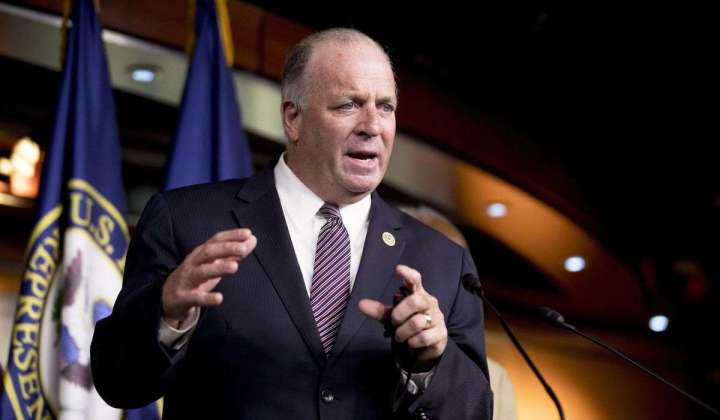Democrats divided on Biden’s tariffs on Chinese solar panels

President Biden’s pause of tariffs on Chinese solar panels is splitting Democrats into dueling camps: climate hawks and China hawks.
Climate hawks say domestic solar energy would be cut off from a cheap foreign supply source accounting for 80% of solar panels used in U.S. projects if a bipartisan resolution is passed to restore tariffs on Chinese companies that violated trade rules.
China hawks seeking to end Mr. Biden’s tariff waiver say it’s about supporting domestic manufacturing and punishing a foreign adversary.
“It’s just unacceptable,” said Rep. Dan Kildee, a Michigan Democrat who broke with Mr. Biden to take the lead on the bipartisan measure. “If the goal is to develop our domestic capacity, we don’t do that by continuing to undermine our own domestic production.”
He doesn’t buy the argument from fellow Democrats that restoring tariffs would jeopardize solar energy.
Mr. Kildee’s measure is a privileged resolution, which means it must receive floor votes in both chambers within the coming weeks under the Congressional Review Act and only requires a simple majority to pass.
It is the latest episode where Democrats are forced to choose whether to cross the aisle against Mr. Biden’s regulatory agenda. Other Democrats and the solar industry, however, are sounding the alarm that tariffs will drive up the cost of solar panels and undercut green policies.
“What this would do is exacerbate the current shortage of panels and put a whole bunch of American electricians and tradespeople out of work in the interim,” said Sen. Martin Heinrich, New Mexico Democrat.
Both sides say their strategy would help domestic manufacturing catch up to demand. A recent study from engineers at Cornell University concluded that making all panels in the U.S. would slash the emissions caused by manufacturing them abroad by 30%. The study said the benefit came from shifting protection away from coal-powered Chinese facilities.
Republicans and pro-tariff Democrats like Mr. Kildee say their tough-on-China stance would stop competitors abroad from actively undercutting domestic suppliers as they try to compete. In addition, they say the perceived threat to domestic solar companies from tariffs, which are currently lifted until June 2024, is overhyped.
“It’s not that complicated. These are companies that are clearly trying to circumvent the tariffs on Chinese products,” Mr. Kildee said. “I also disagree with the premise that in order to meet our targets, we have to look the other way.”
Last year, Mr. Biden declared a two-year solar tariff exemption amid a Commerce Department investigation that froze imports and projects, sending the solar industry into a tailspin.
The agency concluded last December that four companies — three Chinese and one Canadian — dodged tariffs by finishing solar cells and panels in Malaysia, Cambodia, Thailand and Vietnam.
However, the tariffs, which have been in place since 2012, continue to go unpaid because of Mr. Biden’s waiver, despite circumventing U.S. trade rules.
The four Southeast Asian countries account for roughly 80% of U.S. solar panels and key components, prompting fears among domestic industry leaders and most Democrats that reimposing the tariffs would hobble the U.S. solar industry.
The Republican-led House is expected to pass the measure in the weeks after returning from spring break on April 17. The math in the Democratic-controlled Senate is more complicated.
The resolution is sponsored by only Republican senators in the upper chamber. Some Senate Democrats in tough races next year, including Sherrod Brown of Ohio and Bob Casey of Pennsylvania, have previously urged Mr. Biden to reinstate the tariffs but have not said they will back the bipartisan resolution against the administration.
“We have seen decade after decade of American businesses lobbying for weaker trade agreements to go offshore and costing us jobs,” Mr. Brown said. “It is not yet clear to me how we actually [take next steps]. It’s more complicated because of where all the manufacturing has already gone.”
Senate Energy Committee Chairman Joe Manchin III, a West Virginia Democrat up for reelection who has recently sided with Republicans to block other regulations from Mr. Biden, told The Times he’s also undecided.
“We have to bring all that technology back home,” he said. “We really do.”
Democratic Sen. Jacky Rosen, whose home state of Nevada has the most solar jobs per capita in the nation, has lobbied her colleagues against what she described as “job-killing tariffs” that “would decimate our solar industry and kill our ability to meet demand for clean energy.”
Ms. Rosen told fellow Democrats in a memo provided to The Times that reimposing the tariffs now could cost 30,000 solar jobs in the U.S. from an industry of 250,000 — 90% of which are non-manufacturing.
The White House has not weighed in on whether Mr. Biden would veto the resolution. But it has previously argued the tariffs were vital based on demand while more domestic supply comes online.
Democrats who support the temporary tariff freeze accuse opponents of trying to undercut the party’s climate law.
“The opponents of the renewable energy progress are finding whatever procedural tool they have at their disposal to try to slow the momentum,” said Sen. Brian Schatz, Hawaii Democrat.
Mr. Kildee said it’s not a double-edged sword.
“I just don’t buy the argument that we have to sacrifice one principle to pursue another,” he said.






